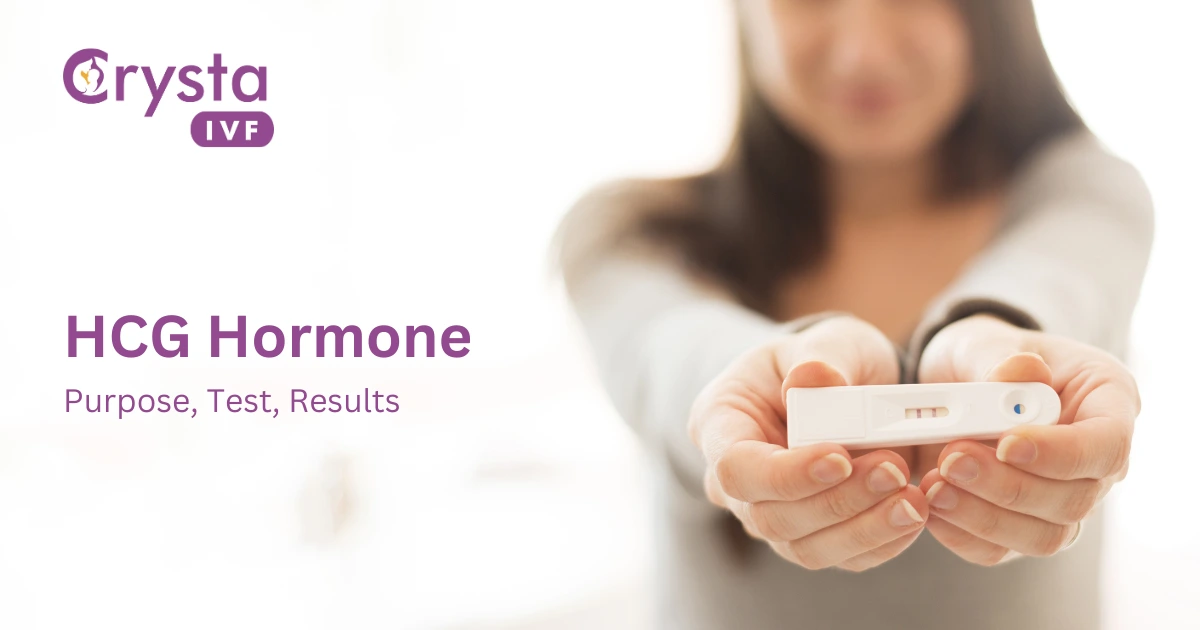Are you looking forward to starting a new chapter in your life? Planning for a family excites you, and you’ve already imagined how your life will be when you hold a baby in your arms. If all these thoughts are running through your mind, you may have heard about the hCG hormone.
Human chorionic gonadotropin (hCG), a hormone produced by the placenta during pregnancy, plays a critical role in fetal development. When a fertilized egg implants in the uterus, the placenta begins to develop and produces hCG. This hormone helps support the growth and development of the embryo by stimulating the production of other hormones, such as estrogen and progesterone.
These hCG levels usually rise in the first few weeks of pregnancy, doubling every few days. This constant increase in hCG is essential to signal the body that pregnancy is about to begin and to trigger changes in the uterus to support fetal growth.
The hCG hormone plays a vital role in fetal development and is used as a marker for pregnancy testing. When a pregnancy test is performed, hCG levels in a woman’s urine or blood are detected. If two lines appear on your pregnancy test, it confirms the presence of hCG, indicating the woman’s pregnancy.
Also Read: How Soon Can a Pregnancy Test Be Taken After Implantation?
However, you should know that hCG hormone levels are not the same for everyone; they can vary from woman to woman, even at the stage of pregnancy. To get accurate results, the fertility specialist will closely monitor your hCG levels throughout the pregnancy to ensure these levels remain within a healthy range.
What types of hCG pregnancy tests are available, and how do they anticipate the results?
The two main types of hCG hormone tests are urine and blood tests, and they anticipate the result in this way:
Urine Tests
Urine tests are the most common type of pregnancy test and are easily accessible. You can even buy them over the counter (OTC) at most drugstores. The urine test will simply detect hCG levels in your urine.
Urine tests usually give appropriate results when used correctly, with a sensitivity of around 97–99%. The urine test will detect hCG levels in the urine at levels as low as 25 mIU/m. However, accuracy can also depend on the brand of testing kit you use.
Blood Tests
Besides urine tests, a blood test is another type of hCG pregnancy test that can be performed to determine if you are pregnant or not. To check your pregnancy there are two types of blood tests: quantitative and qualitative.
Quantitative blood test:
A quantitative blood test examines and calculates the exact amount of hCG in a woman’s blood. This test can detect even low hCG levels, indicating that you can even test your pregnancy in the early stages or get the necessary help when going for fertility treatments to monitor your hCG hormone. These quantitative blood tests are very accurate, with a sensitivity of around 99%.
Qualitative blood test:
A qualitative blood test will simply check the presence of the hCG hormone in a woman’s blood. This test is ideally less sensitive than a quantitative blood test and is usually only conducted to confirm a pregnancy. Like quantitative blood tests, qualitative ones are also very accurate and can show results with up to 99% accuracy.
Moreover, do not forget that the accuracy and reliability of beta-hCG tests can be influenced by various factors such as test timing, variations in hCG hormone levels, and the brand of test kit you are using. If you have any questions and are looking for more accurate test results, it is better if you talk to a fertility specialist and follow the instructions.
How do hCG hormone levels change throughout the pregnancy?
Pregnancy itself is a journey that comes with too many ups and downs. If you want to monitor the hCG hormone progress. Here’s how you can do it:
In a healthy pregnancy, hCG levels usually rise in the first few weeks after conception and multiply later every 48 to 72 hours. By the end of the first trimester, hCG levels peak and gradually start to decline. The accuracy of the hCG hormone level can vary from woman to woman, as the general overview shows:
Week 3 to 4:
- hCG levels are typically low (usually less than 5 mIU/ml) shortly after implantation.
- A home pregnancy test may not yet detect pregnancy at this stage.
Week 5:
- hCG levels should be around 18–7,340 mIU/ml.
- A home pregnancy test can usually detect pregnancy during this week.
Week 6:
- hCG levels typically range from about 1,080 to 56,500 mIU/ml.
- The hCG hormone starts to double every 48 to 72 hours.
Week 7-8:
- hCG levels usually increase to around 7,650 to 229,000 mIU/ml.
- Ultrasound can often detect a fetal heartbeat during this time.
Week 9-12:
- hCG levels typically peak and then start to decline.
- Levels can range from approximately 25,700 to 288,000 mIU/ml.
Week 13 and beyond:
- hCG levels generally stabilize and decrease over time.
- They usually remain around 3,640 to 117,000 mIU/ml.
Keep in mind that these ranges are approximate and can vary from person to person. A single hCG measurement may not provide enough information to determine the health of a pregnancy. Healthcare providers often look at the trend in hCG levels over time and may perform additional tests, such as ultrasound scans, to monitor pregnancy progression and rule out potential issues like ectopic pregnancy or miscarriage.
If you have concerns about your hCG levels during pregnancy, it’s important to consult with a fertility expert, as they can provide personalized guidance and interpretation of your specific situation.
Consult the best fertility specialist now!
In conclusion, the hCG hormone, or human chorionic gonadotropin, is a vital marker in the realm of pregnancy. Produced by the developing placenta, hCG serves as a key indicator of pregnancy, enabling early detection through urine and blood tests. Its levels rise significantly during the early stages of pregnancy and play a crucial role in supporting fetal development.
However, the significance of hCG extends beyond natural conception. In the context of in vitro fertilization (IVF), hCG takes on a pivotal role. In IVF procedures, hCG is often administered to trigger the final maturation and release of eggs from the ovaries, facilitating the retrieval process. Subsequently, it continues to be monitored to confirm the success of embryo implantation.
Knowing how hCG works is important. It helps us make sure someone is pregnant naturally and also helps with treatments like IVF, which aids couples to become parents. It’s like the key to making parenthood possible and bringing happiness to families. Hence, to move forward in the next chapter of your life connect with the top fertiltiy specialist at Crysta IVF the best IVF centre in Lucknow today!





Very quickly this web page will be famous amid all blog viewers, due to it’s fastidious content
Thank you. Glad you found this blog post helpful. Stay tuned for more informative blogs.